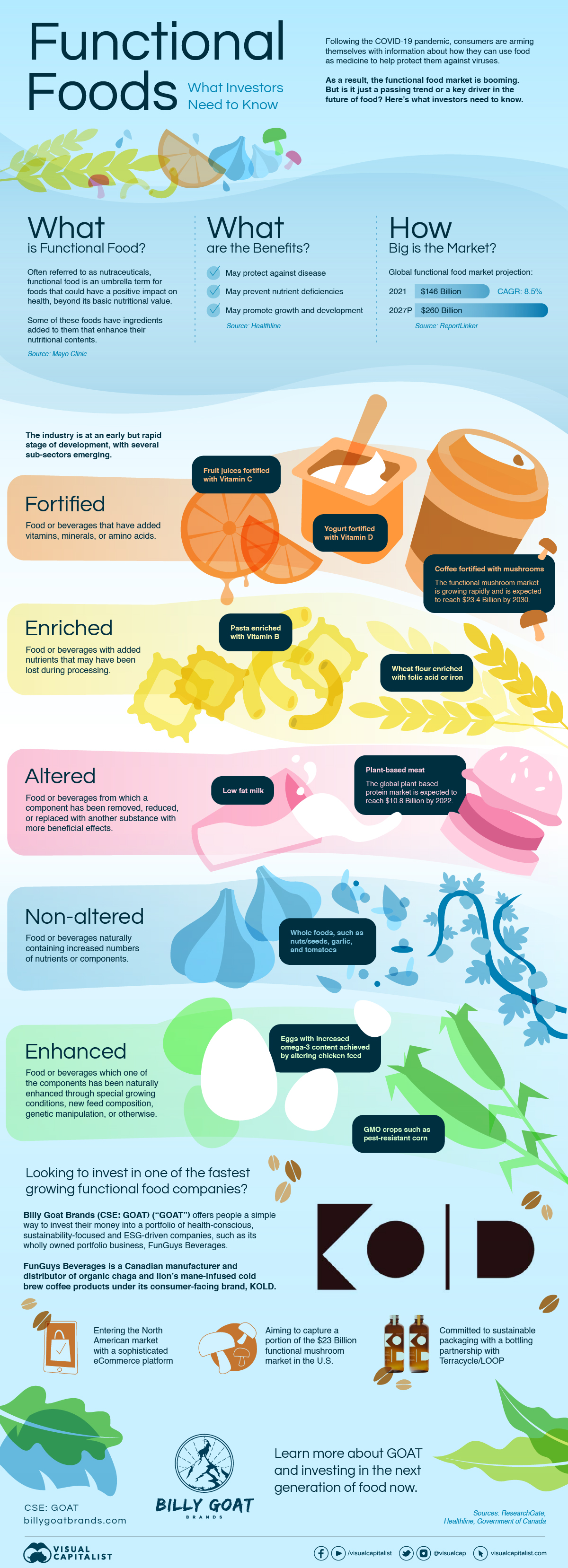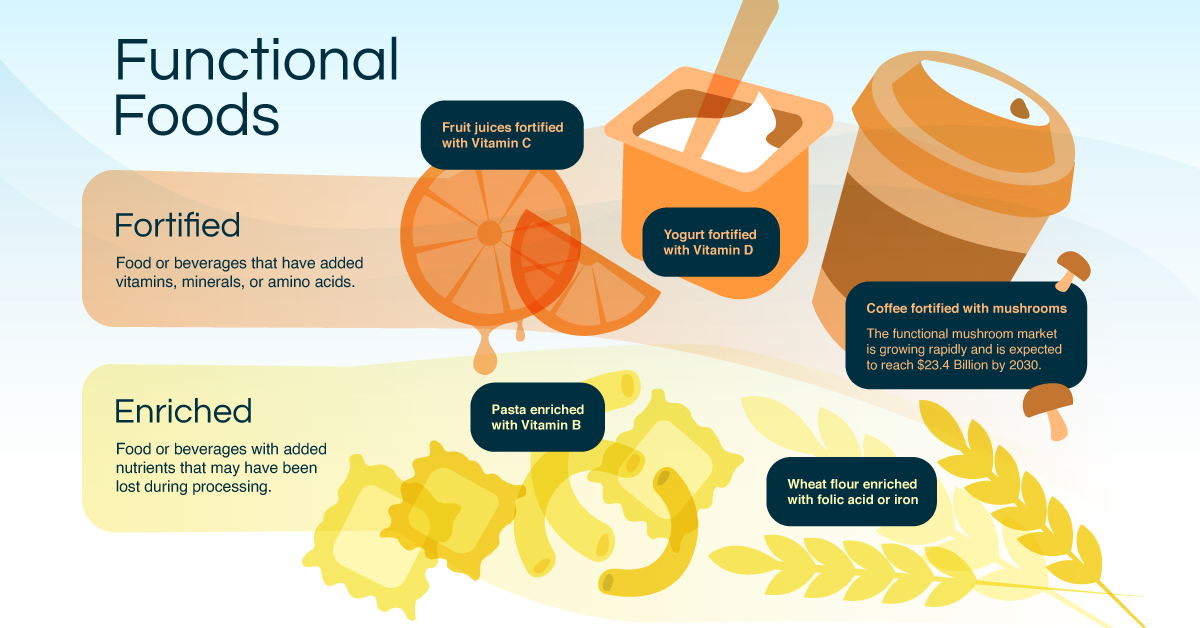The Rise of Functional Food: What Investors Need to Know
The following content is sponsored by Billy Goat Brands (CSE: GOAT) (“GOAT”)

The Rise of Functional Food: What Investors Need to Know
Following the COVID-19 pandemic, consumers are looking for new ways to use food as medicine in a bid to help protect them against disease. As a result, the functional food market is booming.
But is it just the buzzword du jour, or a growth market that investors should seriously consider?
The infographic above from Billy Goat Brands (CSE: GOAT) (“GOAT”) breaks down the key points that investors need to know about how the market is structured.
Functional Food: The Basics
To start, let’s explain what functional food means.
Functional food is an umbrella term that describes food that has a positive impact on your health, beyond its basic nutritional value.
Take oatmeal for example. It contains soluble fiber that can help lower cholesterol levels and reduce inflammation. Therefore it is considered to be a food that is functional. Benefits of these foods may include things like:
- Protecting against disease
- Preventing nutrient deficiencies
- Promoting growth and development
Some foods also have nutrients added to them to enhance their nutritional profile, such as milk with added Vitamin D, and therefore provide the same benefits to consumers.
While there is much debate around the official definition of the term functional food, the most important thing to remember is that they are foods that have added benefits—either natural superfoods, or enhanced during the production process.
Let’s dive into the market on a more granular level.
The Anatomy of the Functional Food Market
Given the shift in consumer values, the market for these kinds of foods is expected to see significant growth over the next decade, and is projected to reach $260 billion by 2027—a compound annual growth rate (CAGR) of 8.5%.
Even though the industry is at an early stage of development, several sub-sectors are emerging in the form of different functional food types.
| Food Type | Definition | Examples |
|---|---|---|
| Fortified | Food or beverages that have added vitamins, minerals, or amino acids. | Fruit juices fortified with Vitamin C, yogurt fortified with Vitamin D, coffee fortified with mushrooms. |
| Enriched | Food or beverages with added nutrients that may have been lost during processing. | Wheat flour enriched with folic acid or iron, pasta enriched with with Vitamin B. |
| Altered | Food or beverages from which a component has been removed, reduced or replaced with another substance with more beneficial effects. | Low fat milk, plant-based meat alternatives. |
| Non-altered | Food or beverages naturally containing increased numbers of nutrients or components. | Whole foods like nuts, seeds, garlic, and tomatoes. |
| Enhanced | Food or beverages which one of the components has been naturally enhanced through special growing conditions, new feed composition, genetic manipulation, or otherwise. | Eggs with increased omega-3 content achieved by altering chicken feed, GMO crops such as pest-resistant corn. |
Altered foods such as plant-based meat alternatives are taking the world by storm and are expected to reach almost $11 billion in 2022 alone.
Invest in the World’s Fastest Growing Functional Food Companies
Billy Goat Brands (CSE: GOAT) offers people a simple way to invest their money into a portfolio of health-conscious, sustainability-focused and ESG-driven companies, such as FunGuys Beverages.
FunGuys Beverages is a Canadian manufacturer and distributor of organic chaga and lion’s mane-infused cold brew coffee products under its consumer-facing brand: KOLD.
The company aims to capture a portion of the functional mushroom market in the U.S. and will be entering the North American market with a sophisticated eCommerce platform.
Learn more about GOAT by clicking this link.
-

 Sponsored3 years ago
Sponsored3 years agoMore Than Precious: Silver’s Role in the New Energy Era (Part 3 of 3)
Long known as a precious metal, silver in solar and EV technologies will redefine its role and importance to a greener economy.
-

 Sponsored7 years ago
Sponsored7 years agoThe History and Evolution of the Video Games Market
Everything from Pong to the rise of mobile gaming and AR/VR. Learn about the $100 billion video games market in this giant infographic.
-

 Sponsored8 years ago
Sponsored8 years agoThe Extraordinary Raw Materials in an iPhone 6s
Over 700 million iPhones have now been sold, but the iPhone would not exist if it were not for the raw materials that make the technology...
-

 Sponsored8 years ago
Sponsored8 years agoThe Industrial Internet, and How It’s Revolutionizing Mining
The convergence of the global industrial sector with big data and the internet of things, or the Industrial Internet, will revolutionize how mining works.


